 Expert's opinion
Expert's opinion
Expert's opinion
The article is a subjective view on this topic written by writers specializing in medical writing.
It may reflect on a personal journey surrounding struggles with an illness or medical condition, involve product comparisons, diet considerations, or other health-related opinions.
Although the view is entirely that of the writer, it is based on academic experiences and scientific research they have conducted; it is fact-checked by a team of degreed medical experts, and validated by sources attached to the article.
The numbers in parenthesis (1,2,3) will take you to clickable links to related scientific papers.
Olive Oil For Hair 2024: Benefits, Risks & How To Use
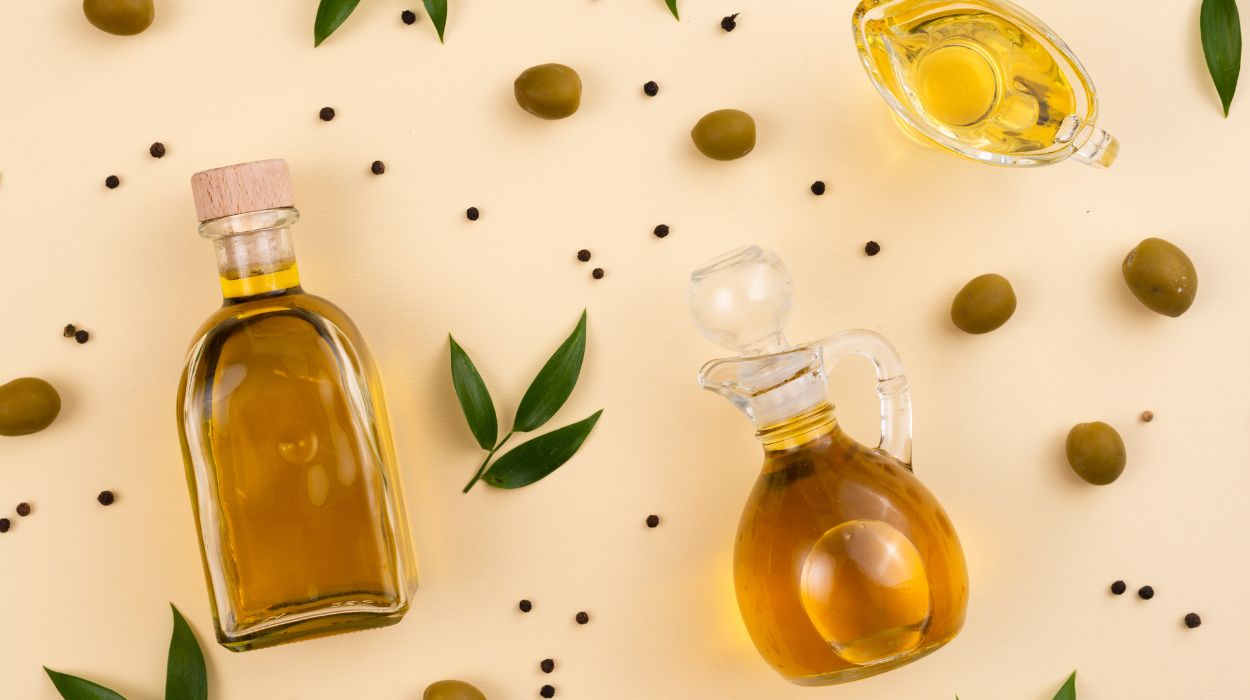
The benefits of olive oil for overall health are well-known, so it doesn’t come as a surprise that there are some positive effects of using olive oil for hair. It might just be the best oil for hair growth, according to experts.
Thanks to all the positive feedback from satisfied users, many brands have begun using extra virgin olive oil in their hair products. Now, you can reap all the olive oil hair benefits for everything from hair growth and preventing hair loss to improving the thickness and strength of your hair strands.
Is Olive Oil Good For Hair?
Yes, olive oil is good for your hair and maintaining a healthy scalp. It’s moisturizing, helps strengthen the hair, keeps it shiny, and protects it from harmful UV sun rays. This oil benefits your hair type, whether you have coarse or fine hair!
Olive Oil For Hair: Benefits You Should Know
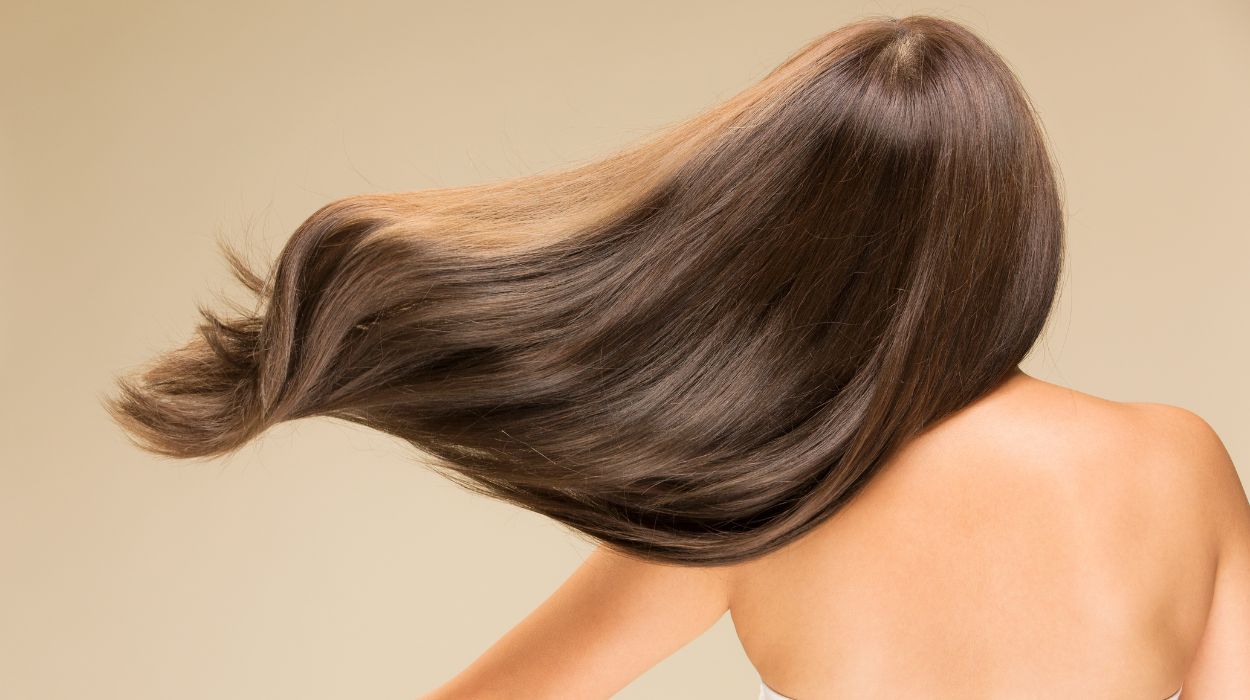
Olive oil is a versatile and widely used ingredient for haircare, with several benefits for your locks. Here are some of the benefits of using this for hair:
- Moisturizes Hair: Olive oil is an excellent natural moisturizer for hair, making it ideal for those with dry or damaged hair. It contains moisturizing ingredients like squalene and oleic acid, which help nourish and hydrate the hair, leaving it soft, shiny, and healthy-looking. Olive oil also helps smooth the hair by sealing the hair cuticle[1] and helping it retain moisture.
- Strengthens Hair: Olive oil contains essential fatty acids, including omega-3 and omega-6,[2] that help to strengthen hair strands and prevent breakage and split ends.
- Reduces Dandruff: Olive oil has antifungal[3] and antibacterial properties[4] that can help reduce dandruff and other scalp conditions.
- Promotes Hair Growth: Olive oil can help promote hair growth by nourishing the hair follicles and increasing blood flow[5] to the scalp.
- Adds Shine: Olive oil can add shine to dull and lifeless hair, and it helps to smooth the hair cuticle, making it reflect light better.
- Protects Hair: Olive oil contains antioxidants[6] that help protect hair[7] from environmental damage, such as UV rays and pollution.
What Hair Types Should Use?
This oil can be used on most hair types, but it may work better for some than others. Here are some recommendations on which types can benefit from using olive oil:
- Dry and damaged hair: Olive oil penetrates the hair shaft and preserves moisture to hydrate and nourish dry hair. If you have hair with broken or burned ends or frizz, olive oil can help improve its appearance and texture.
- Curly and coarse hair: Curly and coarse hair types tend to be more prone to dryness and frizz due to their unique texture. Olive oil can help tame frizz, define curls, and add moisture and shine to curly and coarse hair.
- Thick and textured hair: Thick and textured hair types can also benefit from using olive oil as it helps to nourish and strengthen hair strands. Its emollient properties can help soften and smoothen the hair, making it more manageable.
- Normal hair: Even if you have normal hair that isn’t prone to dryness or damage, olive oil can still help improve its health and appearance. It can add shine and nourishment to your hair, making it look and feel healthy.
- Fine or straight hair:: If you have fine or thin hair, using too much olive oil can weigh it down[8] and make it look and feel greasy. It’s best to use it sparingly and rinse thoroughly to avoid any buildup.
How To Use Olive Oil For Hair Growth
If you want to use olive oil for hair growth and thickness but don’t know where to start, here’s how to begin:r.
- Warm the olive oil up slightly in a microwave-safe bowl or on the stove until it’s warm but not hot.
- Apply olive oil to your scalp by parting your hair and massaging it into your scalp with your fingertips for a few minutes. This will help to increase blood circulation and stimulate hair growth.
- After you’ve massaged the oil into your scalp, apply it to the length of your hair. This will help to nourish and strengthen your hair strands.
- Cover your hair with a shower cap or towel and leave the olive oil in your hair overnight or for at least 30 minutes.
- After the recommended time, wash your hair with a mild shampoo and conditioner to remove the oil. Make sure to rinse your hair thoroughly to avoid any buildup.
You can repeat this process once a week or as needed to promote hair growth. You can also mix olive oil with other natural ingredients such as honey, coconut oil,[9] or castor oil[10] for added benefits.
Side Effects Of Using Olive Oil For Hair
Olive oil is generally considered safe for use, but there are a few potential side effects to be aware of:
- Greasiness: Using too much olive oil or not washing it out thoroughly can leave hair looking greasy and weighed down.
- Allergic reaction: Some people may be allergic to olive oil[11] or other ingredients that are mixed with it. If you experience any itching, redness, or swelling after using olive oil on your hair, stop using it and consult a healthcare professional.
- Clogged pores: Applying too much olive oil to the scalp can clog hair follicles and pores, leading to scalp irritation or acne.
- Smell: Olive oil has a distinct smell that some people may find unpleasant. If you don’t like the smell, you can add a few drops of essential oil to the olive oil or use a scented shampoo to help mask the smell.
- Dandruff: You should not use olive oil in your hair if you have dandruff, as olive oil can promote the growth of the yeast[12] that causes dandruff.
To minimize the risk of side effects, it’s best to use olive oil in moderation and rinse it out thoroughly. Start with a small amount of oil and increase gradually if needed. If you have any concerns or experience any adverse reactions, consult a board-certified dermatologist.
Other Oils Good For Hair Growth
In addition to this oil, several other oils are good for hair growth and can help promote healthy, strong, and beautiful hair. Here are the five best oils for hair growth:
Castor Oil
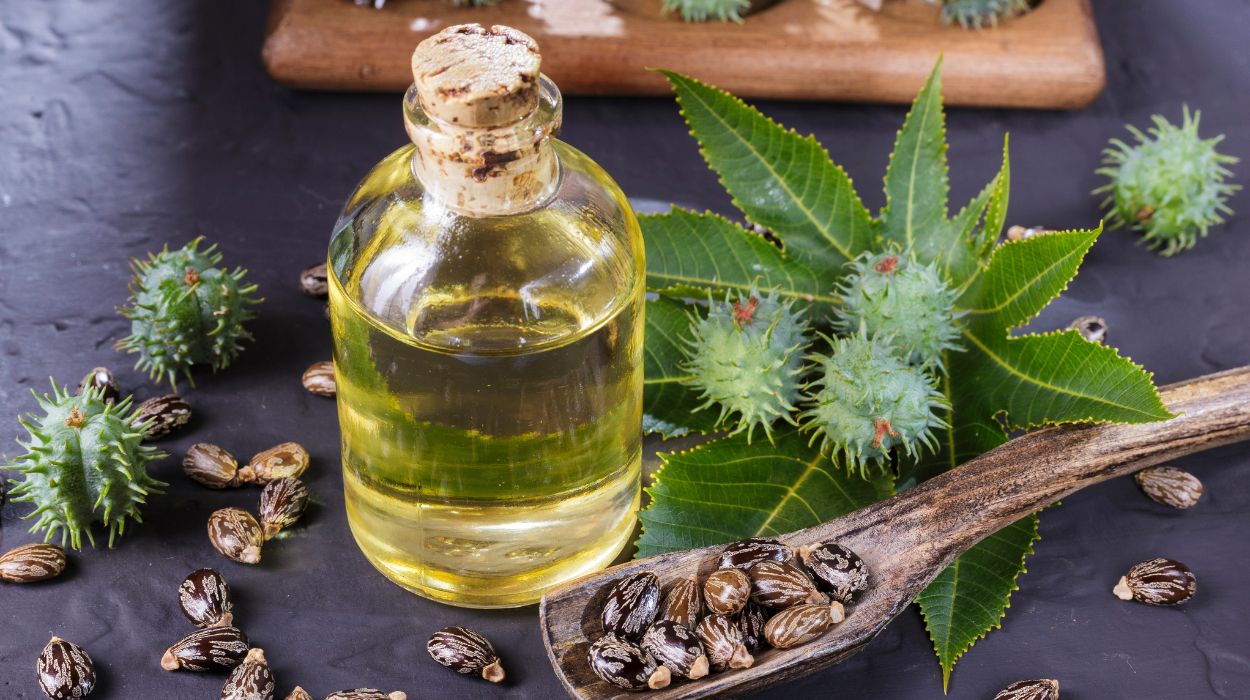
Castor oil is rich in ricinoleic acid,[13] which has anti-inflammatory properties and can help stimulate hair growth. It also contains omega-6 and omega-9 fatty acids, which nourish and moisturize the scalp.
Coconut Oil
Coconut oil is a natural emollient[14] — a moisturizer that softens hair. It contains lauric acid, which can penetrate hair strands and help reduce protein loss, leading to stronger and healthier hair.
Argan Oil
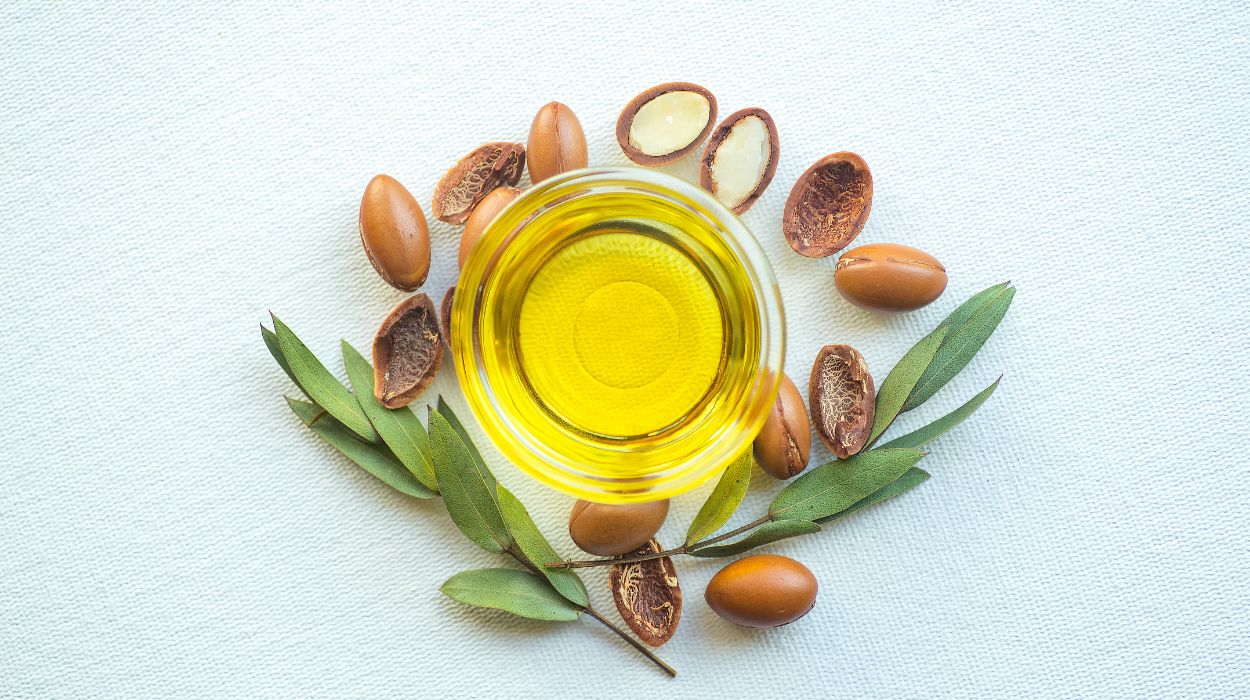
Argan oil is rich in vitamin E, antioxidants, and fatty acids, which can help nourish and protect hair.[15] In addition to being rich in hair vitamins, it can also help improve hair elasticity and reduce hair breakage.
Jojoba Oil
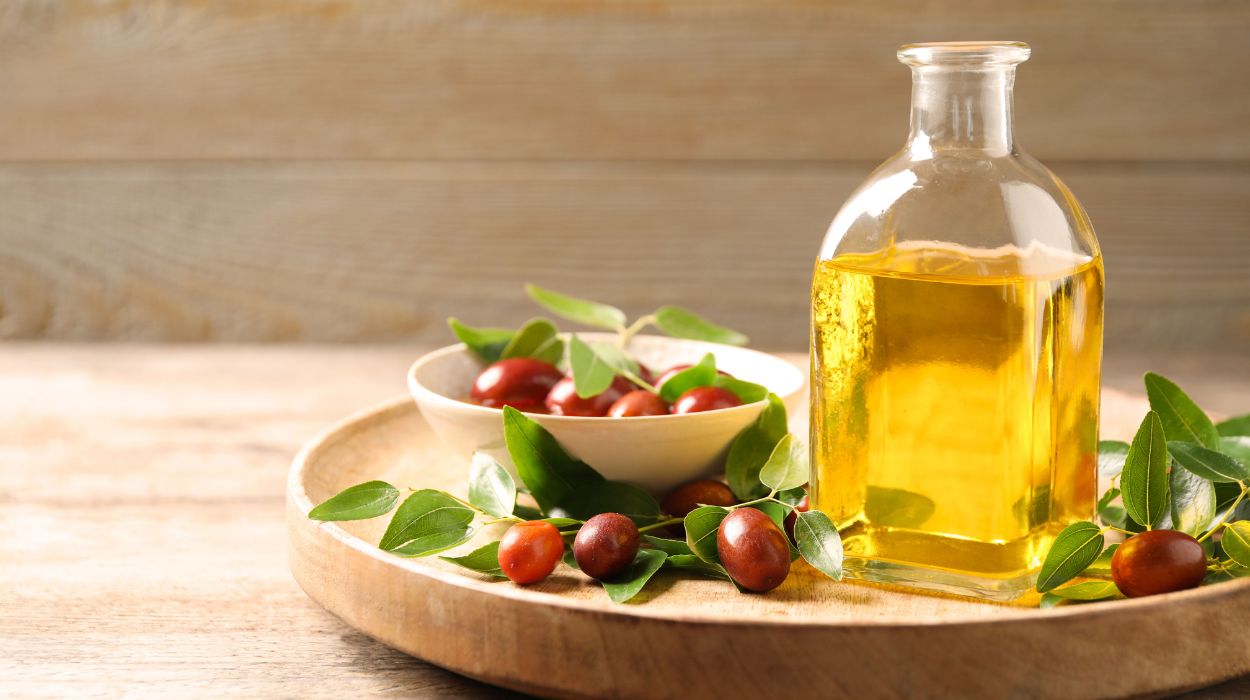
Jojoba oil is similar in composition[16] to the natural oils produced by the scalp, making it an excellent natural moisturizer for the hair. It can help strengthen hair strands and improve hair texture.
Rosemary Oil
Rosemary oil has been shown[17] to promote hair growth by stimulating blood circulation to the scalp. It also has anti-inflammatory and antioxidant properties, which can help improve scalp health.
These oils can be used on their own or mixed with other natural ingredients to make hair masks or treatments. It’s important to remember that everyone’s hair is different, and what works for one person may not work for another. Experiment with different oils and find the ones that work best for your hair type and needs.
Conclusion
This is one of the best oils for you, especially if you are prone to dryness or are thick and curly. Be careful when using it in your haircare routine to prevent greasiness, and get the best from the nourishing omega-3 fatty acids olive oil provides.
+ 17 sources
Health Canal avoids using tertiary references. We have strict sourcing guidelines and rely on peer-reviewed studies, academic researches from medical associations and institutions. To ensure the accuracy of articles in Health Canal, you can read more about the editorial process here
- Mysore, V. and Adhikary Arghya (2022). Hair oils: Indigenous knowledge revisited. [online] 14(3), pp.84–84. doi:https://doi.org/10.4103/ijt.ijt_189_20.
- Usda.gov. (2023). FoodData Central. [online] Available at: https://fdc.nal.usda.gov/fdc-app.html#/food-details/748608/nutrients.
- Z Nasrollahi and Mohaddeseh Abolhasannezhad (2015). Evaluation of the antifungal activity of olive leaf aqueous extracts against Candida albicans PTCC-5027. [online] 1(4), pp.37–39. doi:https://doi.org/10.18869/acadpub.cmm.1.4.37.
- Nazzaro, F., Fratianni, F., Cozzolino, R., Martignetti, A., Malorni, L., Vincenzo De Feo, Cruz, A.G. and d’Acierno, A. (2019). Antibacterial Activity of Three Extra Virgin Olive Oils of the Campania Region, Southern Italy, Related to Their Polyphenol Content and Composition. [online] 7(9), pp.321–321. doi:https://doi.org/10.3390/microorganisms7090321.
- Tong, T., Kim, N.-H. and Park, T. (2015). Topical Application of Oleuropein Induces Anagen Hair Growth in Telogen Mouse Skin. [online] 10(6), pp.e0129578–e0129578. doi:https://doi.org/10.1371/journal.pone.0129578.
- Truong, T., Yun, J., Lee, D.-H., Chung, J.-S. and Kwon, S.-M. (2021). Protective Effects and Benefits of Olive Oil and Its Extracts on Women’s Health. [online] 13(12), pp.4279–4279. doi:https://doi.org/10.3390/nu13124279.
- Baumann, L. and Weisberg, E.M. (2010). Olive Oil in Botanical Cosmeceuticals. [online] pp.1117–1124. doi:https://doi.org/10.1016/b978-0-12-374420-3.00122-4.
- Maria Inês Dias (2015). Hair cosmetics: An overview. [online] 7(1), pp.2–2. doi:https://doi.org/10.4103/0974-7753.153450.
- Rele AS;Mohile RB (2021). Effect of mineral oil, sunflower oil, and coconut oil on prevention of hair damage. Journal of cosmetic science, [online] 54(2). Available at: https://pubmed.ncbi.nlm.nih.gov/12715094/.
- Alookaran J;Tripp J (2022). Castor Oil. [online] Available at: https://pubmed.ncbi.nlm.nih.gov/31869090/.
- Isaksson, M. and Magnus Bruze (1999). Occupational allergic contact dermatitis from olive oil in a masseur. [online] 41(2), pp.312–315. doi:https://doi.org/10.1016/s0190-9622(99)70372-5.
- Ciafardini, G. and Zullo, B.A. (2018). Virgin olive oil yeasts: A review. [online] 70, pp.245–253. doi:https://doi.org/10.1016/j.fm.2017.10.010.
- Febri Odel Nitbani, Putra, Hermania Em Wogo and Rohi, I. (2022). Preparation of Ricinoleic Acid from Castor Oil:A Review. [online] 71(6), pp.781–793. doi:https://doi.org/10.5650/jos.ess21226.
- Saxena, R., Mittal, P., Cécile Clavaud, Dhakan, D.B., Roy, N., Breton, L., Misra, N. and Sharma, V. (2021). Longitudinal study of the scalp microbiome suggests coconut oil to enrich healthy scalp commensals. [online] 11(1). doi:https://doi.org/10.1038/s41598-021-86454-1.
- Sharifi, N., Sanaz Hamedeyazdan, Javad Shokri and Farnaz Monajjemzadeh (2022). Argan oil as a pretreatment of human hair before exposure to oxidative damage: Attenuated total reflectance and protein loss studies. [online] 21(10), pp.5010–5017. doi:https://doi.org/10.1111/jocd.14885.
- Luca Casettari, Roberts, A., Hamzi, S.H., Gad, H.A., Ilham Touiss, Altyar, A.E., Osama Adnan Kensara and Ashour, M.L. (2021). Jojoba Oil: An Updated Comprehensive Review on Chemistry, Pharmaceutical Uses, and Toxicity. [online] 13(11), pp.1711–1711. doi:https://doi.org/10.3390/polym13111711.
- Murata, K., Noguchi, K., Kondo, M., Onishi, M., Watanabe, N., Okamura, K. and Matsuda, H. (2013). Promotion of Hair Growth byRosmarinus officinalisLeaf Extract. [online] 27(2), pp.212–217. doi:https://doi.org/10.1002/ptr.4712.



